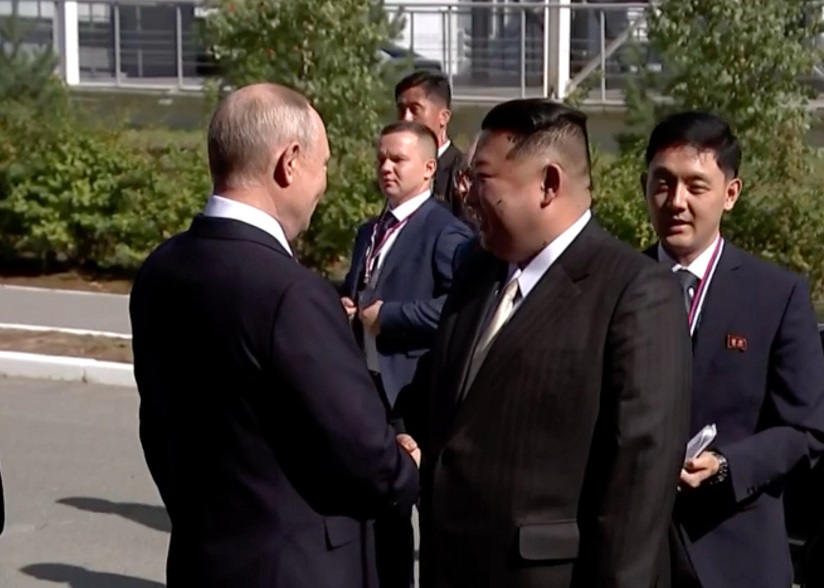Kim and Putin meet at cosmodrome to talk trade, especially in grains
The long-anticipated summit is held in Vostochny, while North Korea tests more rockets. Moscow needs ammunition for its war in Ukraine, while Pyongyang wants satellite technology. But the real urgency is food for a hungry country. For Kim, it is vital that Moscow resume its wheat exports after he closed the borders during the COVID-19 pandemic.
Seoul (AsiaNews/Agencies) – The much-anticipated meeting between Russian President Vladimir Putin and North Korean leader Kim Jong-un took place this morning at the Vostochny Cosmodrome in Russia's far east.
Kim, who does not usually travel abroad, arrived in Russia yesterday aboard his armoured train.
Observers note that this visit, in addition to confirming the friendship between the two countries, is meant to boost bilateral trade with North Korea supplying Russia with weapons and ammunition, vital for Moscow’s invasion of Ukraine, in exchange for fossil fuels North Korea needs to ensure its energy security, as well as satellite technologies for its nuclear programme.
As Kim made his way into Russia, his military fired two more short-range ballistic missiles into the sea after travelling 650 kilometres.
For North Korea, satellite technology is crucial to further develop its military capability, and the choice of a cosmodrome as the venue for talks with Putin is no accident.
When reporters asked if Russia was going to help North Korea build satellites, Putin is supposed to have said that this is "why we are here today."
The result would be stronger ties between Russia and North Korea, one of the few countries to have openly supported the invasion of Ukraine, but also increase their international isolation.
Economic relations with North Korea are subject to strict international sanctions approved by the United Nations Security Council of which Russia is a member.
But behind the emphasis on the military aspect, Moscow has another ace up its sleeve vis-à-vis North Korea: food. In fact, food insecurity may have prompted Kim to travel to Russia in the first place.
It is well known that North Korea’s agriculture is in a disarray. Past policies and massive deforestation have made the country particularly vulnerable to soil quality deterioration. In addition, typhoons that rage from June to October in East Asia are particularly destructive, wiping out crops and infrastructure.
Farming today requires large inputs of fossil fuels and technologies, which are both under sanctions.
Until the COVID-19 pandemic, the worst famine that struck the country was in 1994-1998, with 240,000 to 600,000 deaths from starvation.
Food, especially grains, makes up a significant part of North Korea's imports from abroad and as its main economic partners, China and Russia play a vital role in the country's food security.
In 2019, Russia delivered some 2,000 tonnes of wheat to North Korea through the World Food Programme; in 2020 grains again constituted the largest proportion of Russian exports to the country, worth more than US$ 15 million.
Reliance on foreign supplies has, however, proven fatal for North Korea when COVID-19 struck. With borders closed and trade placed under tight controls, plus particularly harsh typhoons, the country's ability to produce enough food for its population was undermined.
Recently, the BBC was able to speak to some North Koreans who said that food was so scarce that some people dropped dead from starvation in the street.
Rimjin-gang, a magazine dedicated to North Korea owned and operated by a joint Japanese and Korean editorial group, secretly collects information from North Koreans.
In one of its latest reports, it noted a worsening situation based on the latest market price index in the country. The latter shows that the price of rice and other grain is up, an indicator that food shortages are a reality.
Recently, North Korean officials announced that it would exert more control over the agricultural sector, which Kim deems of strategic importance for the country. Further measures could be taken to implement a planned economy.
Past failures to provide wheat through state facilities and the iron will to devote scarce resources to the nuclear programme could increase North Korea’s food dependence on foreign partners.
For this reason, imports of grains and other foodstuffs from Russia in the post-pandemic period will be a key aspect in bilateral relations.
12/02/2016 15:14
24/06/2020 09:38
20/06/2020 11:03







.png)










